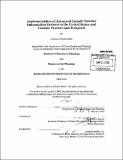Implementation of advanced transit traveler information systems in the United States and Canada : practice and prospects
Author(s)
Rizos, Anthony Charles
DownloadFull printable version (5.643Mb)
Other Contributors
Massachusetts Institute of Technology. Dept. of Urban Studies and Planning.
Advisor
P. Christopher Zegras.
Terms of use
Metadata
Show full item recordAbstract
Over the past few years, public transit agencies across the United States and Canada have increasingly implemented methods for passengers to access traveler information using new media and personal mobile communications devices. The most advanced examples of these devices, commonly known as "smartphones," combine telephone, Internet browsing, and personal digital assistant (PDA) functionality into a single, portable unit. Mobile data applications are literally exploding on the scene every day, and transit agencies are under tremendous social and political pressure to deploy more related information systems as rapidly as possible. These applications are popular with technology-savvy riders who enjoy easy and real-time access to information and updates about their transit routes and services of choice, anywhere they happen to be. A review of the literature, as well as interviews with managers at thirteen transit authorities across the spectrum of size and technical sophistication, provides a portrayal of the states of the practice and art, and paints a clear picture of the challenges facing implementation of these advanced systems in the field. The research confirms the initial hypothesis that while transit agencies are indeed devoting energy to pursuing advanced traveler information systems, the approaches to implementing them could be improved. Based on the findings, I recommend that transit agencies: conduct necessary market research; develop more explicit and comprehensive traveler information system strategies; clarify the role and business case for social media; secure sufficient financial and technology resources; ensure sufficient operating as well as capital funding; eliminate constraints on use of data from commercial software; and, adopt and embrace open-source software development using an "open government" model.
Description
Thesis (M.C.P. and S.B. in Planning)--Massachusetts Institute of Technology, Dept. of Urban Studies and Planning, 2010. Cataloged from PDF version of thesis. Includes bibliographical references (p. 101-115).
Date issued
2010Department
Massachusetts Institute of Technology. Department of Urban Studies and PlanningPublisher
Massachusetts Institute of Technology
Keywords
Urban Studies and Planning.